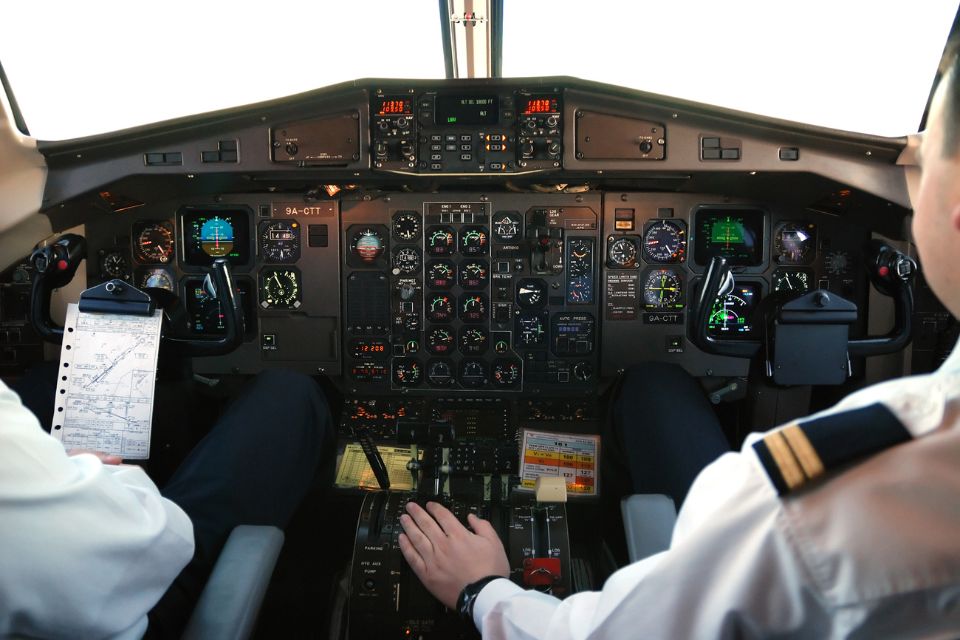Your Guide to Online IFR Training Costs
Embarking on the journey to become an instrument-rated pilot is a thrilling step towards mastery of the skies. The freedom and precision that come with an Instrument Flight Rules (IFR) rating are unparalleled. But before you take off on this adventure, it’s essential to understand the investment involved. In this guide, we’ll navigate the costs associated with online IFR training, ensuring your path to becoming an IFR pilot is clear and within reach.
Article-at-a-Glance
- Discover the significance of obtaining an Instrument Rating for pilots.
- Explore the safety benefits and confidence that come with IFR proficiency.
- Uncover the doors that an Instrument Rating opens for your aviation career.
- Learn about the structure and components of online IFR training courses.
- Gain insight into the costs and value of online IFR training options.
Why Consider an Instrument Rating?
As a pilot, your wings carry you above the clouds, but it’s the Instrument Rating that lets you navigate through them. This coveted certification is more than a badge of honor; it’s a crucial enhancement to your flying capabilities. With it, you can fly under IFR, which means you’re qualified to operate in a broader range of weather conditions and airspaces. It’s not just about expanding your horizons; it’s about sharpening your skills to the finest edge.
The Safety and Confidence of IFR Pilots
With an Instrument Rating, you’ll gain a deeper understanding of your aircraft’s systems and the environment in which you fly. This knowledge translates to a significant increase in safety. Imagine flying with the confidence that comes from knowing you can handle unexpected weather changes or navigate through low visibility. That peace of mind is priceless, and it’s a testament to the rigorous training that defines the IFR curriculum.
“Flying is inherently safe, but the margin of safety is based on the quality of training and the pilot’s ability to make informed decisions. An Instrument Rating equips pilots with both.” – A seasoned flight instructor’s perspective.
Opportunities Unlocked with an Instrument Rating
Think of an Instrument Rating as a key to unlocking new opportunities in aviation. Whether you aim to fly for commercial airlines, become a flight instructor, or simply enjoy personal travel with fewer restrictions, an IFR certification is your gateway. It’s a step up in the aviation world that showcases your dedication and skill, making you a more attractive candidate for any flying position.
- Commercial flying opportunities increase with IFR qualifications.
- Become eligible to instruct other pilots as a certified IFR instructor.
- Enjoy greater flexibility and fewer weather-related cancellations in personal flying.
- Enhance your decision-making skills and in-flight management abilities.
Understanding Online IFR Training
The digital age has transformed pilot training, bringing the classroom to your doorstep. Online IFR training is a flexible, cost-effective way to pursue your Instrument Rating. It allows you to study at your own pace, on your own schedule, without sacrificing the quality of your education. The courses are designed to be interactive, engaging, and, most importantly, comprehensive.
Online training programs offer a blend of video tutorials, practice exams, and personalized instruction that can rival traditional in-person training. The curriculum is thorough, covering everything from the intricacies of navigation systems to the nuances of federal aviation regulations. This method of learning not only prepares you for the written exam but also lays a solid foundation for the practical skills you’ll need in the cockpit.
Choosing to train online means you’re taking control of your educational journey. It’s a proactive approach that reflects the autonomy of being a pilot. You’re not just learning to follow instruments; you’re learning to lead in the aviation community.
Transitioning from Cockpit to Computer
Moving from hands-on flight training to a virtual classroom might seem daunting at first. Yet, the transition to computer-based learning is a seamless process designed to enhance, not hinder, your aviation education. Online IFR courses are structured to simulate real-world flying scenarios, providing interactive modules that make complex concepts easier to grasp. It’s about bringing the cockpit controls to your screen, allowing you to visualize and practice the principles of instrument flying before you even step foot in an airplane.
- Interactive simulators replicate in-flight conditions for practical learning.
- Flexible scheduling means you can train around your lifestyle and commitments.
- Progress at your own pace, reviewing complex topics as needed for mastery.
- Access to a wealth of resources, including charts, approach plates, and FAA handbooks.
- Direct communication with instructors for personalized feedback and guidance.
Components of an Online IFR Course
An effective online IFR course is more than just a series of lectures. It’s a comprehensive toolkit designed to equip you with every resource necessary for success. The components of these courses are crafted to cover all aspects of instrument flying, from the theoretical knowledge to the practical skills you’ll apply in the air.
- HD video lessons and animations that bring complex concepts to life.
- Practice exams and quizzes to reinforce learning and prepare for the FAA test.
- Flight simulator scenarios to hone your instrument navigation skills.
- A personal dashboard to track your progress and identify areas for improvement.
- Support forums and peer networks to connect with other IFR students.
Breaking Down the Costs
Understanding the financial aspect of online IFR training is crucial. You’ll need to consider several factors, including course fees, additional materials, and the potential need for in-person flight training to complement your online studies. Let’s break down these costs to give you a clear picture of what to expect financially as you embark on this journey.
Online IFR Training: A Cost Overview
Online IFR training courses vary in price, but they typically offer a more affordable alternative to traditional flight schools. You can expect to pay anywhere from a few hundred to a couple of thousand dollars for a quality online course. This fee often includes lifetime access to course materials, updates, and sometimes even bonus content like webinars and expert interviews.
- Course fees typically range from $300 to $2,500.
- Some courses offer payment plans to spread out the cost.
- Look for courses that include free updates and additional learning materials.
- Consider the cost savings from reduced travel and accommodation expenses.
Comparing Online and Traditional IFR Training Expenses
When compared to traditional IFR training, online courses stand out for their cost-effectiveness. Traditional flight schools often require a larger upfront investment, not just for the instruction but also for the associated costs of aircraft rental, fuel, and instructor time. In contrast, online training can be a more budget-friendly option, especially for those who are disciplined self-learners and can effectively manage their study time.
It’s important to note that while online training covers the theoretical aspect of IFR training, you will still need to budget for actual flight hours required for certification. However, the overall expense is generally lower when you combine online coursework with the minimum required in-person flight training.
Decoding the Value in Your Investment
When considering the cost of online IFR training, it’s essential to look beyond the price tag. The value of an online course lies in its ability to provide high-quality education that’s accessible and flexible. The investment you make in an online IFR course is an investment in your future as a pilot. It’s not just about passing a test; it’s about building a foundation of knowledge that will serve you throughout your aviation career.
- High-quality, comprehensive training that prepares you for real-world flying.
- Opportunity to learn from experienced instructors and industry experts.
- Flexibility to study on your terms, leading to better retention and understanding.
- Cost savings on travel, accommodation, and traditional school overheads.
- Long-term access to materials for ongoing learning and reference.
By choosing online IFR training, you’re not just saving money; you’re embracing a modern approach to aviation education that can be tailored to fit your individual needs and goals. It’s a smart, strategic move that aligns with the precision and forward-thinking required of an instrument-rated pilot.
Long-Term Benefits vs. Up-front Costs
It’s vital to weigh the long-term benefits against the up-front costs when selecting an online IFR training program. The initial expense may seem significant, but the investment pays dividends in your future aviation endeavors. With an Instrument Rating, you can fly in various weather conditions, making you a more versatile and employable pilot. This opens up career opportunities and can lead to higher earning potential. Moreover, the skills and knowledge gained from IFR training contribute to your overall safety and proficiency, which are invaluable in the aviation industry.
- Enhanced employability and career advancement opportunities.
- Increased earning potential as a more skilled and versatile pilot.
- Greater safety and proficiency in diverse flying conditions.
- Long-term savings from owning the skillset to fly in less-than-ideal weather, reducing delays.
Hidden Savings in Online Training Programs
Online IFR training programs offer hidden savings that go beyond the apparent cost differences. The convenience of studying from home eliminates the need for commuting, saving both time and money on transportation. Additionally, the ability to self-pace your learning can reduce the number of hours spent with an instructor, leading to fewer billable hours and thus lower costs for practical flight training. These savings can make a significant difference in your overall training budget, making online IFR training a smart financial choice.
- No commuting costs or time wasted in transit to a flight school.
- Reduced need for physical textbooks and materials with online resources.
- Potential to decrease billable instructor hours with efficient self-study.
- Flexibility to maintain a job while training, ensuring a steady income.
Choosing the Right Online IFR Training Course
Choosing the right online IFR training course is a decision that should be made with careful consideration. The quality of your training will directly impact your skills as a pilot. You want a course that not only prepares you for the written exam but also lays a solid foundation for practical flight skills. It’s essential to research and compare different programs, looking for comprehensive content, experienced instructors, and positive student outcomes.
Must-Have Features in Online IFR Training
When selecting an online IFR training course, there are several must-have features to look for:
- Comprehensive curriculum that covers all the necessary topics for the IFR rating.
- Interactive elements such as simulations and quizzes to enhance learning.
- Access to experienced instructors for personalized guidance.
- Up-to-date materials that reflect the latest FAA regulations and procedures.
- Student support services, including forums or chat for peer interaction.
- Positive reviews and testimonials from former students.
- Clear, structured lesson plans that facilitate easy progress tracking.
How to Identify Quality IFR Training Providers
To identify quality IFR training providers, start by examining their track record and reputation within the industry. Look for providers that have a proven history of student success, including high pass rates on the FAA written exams and positive feedback from alumni. Ensure that the course content is regularly updated to keep pace with changes in aviation regulations. A provider’s accreditation and affiliations with reputable aviation organizations can also be a strong indicator of quality.
- Check for high pass rates and positive student outcomes.
- Read reviews and seek feedback from the aviation community.
- Verify that the course content is current and regularly updated.
- Look for accreditation and professional affiliations.
- Assess the level of instructor support and availability.
Getting Ready for Takeoff
As you prepare to embark on your IFR training journey, it’s important to ensure you have everything in place for a successful experience. This means having the right equipment, such as a reliable computer and internet connection, and setting aside dedicated study time in your schedule. Familiarize yourself with the course structure and make a plan for how you’ll approach each module. Remember, the journey to becoming an instrument-rated pilot is as much about the process as it is about the destination. Approach your training with dedication and enthusiasm, and you’ll be ready for takeoff in no time.
- Ensure you have the necessary technology and study environment.
- Create a study schedule that aligns with your lifestyle and commitments.
- Engage with the course material actively and consistently.
- Reach out to instructors and peers for support when needed.
- Keep your end goals in mind to stay motivated throughout your training.
Navigating the Course Curriculum
Embarking on your online IFR training begins with understanding the course curriculum. It’s a map that guides you through the terrain of instrument flying. Each module builds upon the last, ensuring a solid foundation of knowledge. Start with the basics of instrument flight, progress through navigation and meteorology, and culminate with the intricacies of IFR cross-country flight planning. The key is to approach each lesson methodically, ensuring you fully grasp the material before advancing.
- Begin with foundational concepts before progressing to advanced topics.
- Allocate time to review each section thoroughly, especially challenging areas.
- Utilize available resources, such as charts and simulators, to deepen your understanding.
- Regularly test your knowledge with practice quizzes and exams.
- Plan your study schedule to align with the course’s structure and pace.
Maximizing Your Learning Experience Online
To maximize your learning experience, treat your online IFR training as you would in-person classes. Set up a dedicated study space free from distractions. Engage actively with the material by taking notes and asking questions. Most importantly, take advantage of the flexibility online learning offers. If a particular lesson is complex, don’t rush. Pause and replay sections, or reach out to your instructors for clarification. The beauty of online training is that it adapts to your learning style, not the other way around.
- Create a study space that mimics a classroom environment.
- Actively participate by taking notes and asking questions.
- Use the flexibility to your advantage, learning at your own pace.
- Engage with other students through forums to gain different perspectives.
- Regularly schedule time for review to reinforce your retention of the material.
Frequently Asked Questions (FAQ)
Can I fully prepare for the IFR rating through online courses alone?
Yes, online courses can fully prepare you for the IFR written exam and the theoretical components of the rating. They are comprehensive and designed to cover all the knowledge areas required by the FAA. However, to obtain your IFR rating, you must also complete the required flight hours with a certified instructor. Online courses are a significant part of your training, but they work best when combined with actual flying experience.
Is the cost for online IFR training inclusive of practical flight sessions?
Typically, the cost for online IFR training covers the theoretical aspects of the course and does not include practical flight sessions. You will need to budget separately for in-person flight training, which involves aircraft rental, fuel, and instructor fees. It’s important to factor these costs into your overall training budget when planning for your Instrument Rating.
What is the average time commitment for completing an online IFR course?
The time commitment for an online IFR course can vary based on the individual and the specific program. On average, students can expect to spend anywhere from 2 to 4 months completing the theoretical portion of their IFR training online. This includes studying for and passing the FAA written exam. Remember, this time frame is flexible, and one of the advantages of online learning is the ability to adjust it based on your personal schedule and pace of learning.
How do I validate the effectiveness of an online IFR training program?
Validating the effectiveness of an online IFR training program is key to ensuring your investment leads to success. Start by examining the program’s pass rates for the FAA written exams and check for testimonials from previous students. A reliable program will transparently share this information. Also, look for a trial period or a money-back guarantee, which can provide a safety net if the course doesn’t meet your expectations. Engaging with the community, such as online forums or social media groups, can also give you insight into the program’s reputation and effectiveness.
- Check the program’s FAA exam pass rates and student testimonials.
- Look for a trial period or money-back guarantee.
- Engage with past students and instructors for firsthand accounts.
- Assess the quality of the course’s customer support and resources.
- Ensure the program offers updated content and follows FAA guidelines.
Can I access course materials after completion for future reference?
Continued access to course materials after completion is an essential feature of a quality online IFR training program. Most reputable courses offer lifetime access, allowing you to revisit the content whenever you need a refresher. This is particularly valuable as regulations and procedures evolve, and as you may want to brush up on certain topics before flight reviews or checkrides. Confirm this feature before enrolling, as it adds long-term value to your educational investment.
- Most quality programs offer lifetime access to course materials.
- Revisit content for refreshers ahead of flight reviews or advanced training.
- Ensure the course you choose offers this long-term benefit.
- Look for programs that regularly update their materials to stay current.
In conclusion, the path to obtaining an Instrument Rating through online training is an exciting and viable option for aspiring pilots. It offers flexibility, cost-effectiveness, and the ability to study at your own pace. While the journey requires dedication and a commitment to understanding the costs involved, the benefits of becoming an IFR-rated pilot are immeasurable. You’ll gain the confidence to navigate the skies in challenging conditions, open up new career opportunities, and most importantly, enhance your safety and proficiency as a pilot.
As you take this next step in your aviation journey, remember to choose an online IFR training program that is comprehensive, reputable, and provides long-term value. Verify its effectiveness through pass rates, student experiences, and ensure you have continued access to the course materials. With the right program and a commitment to your training, you’ll be well on your way to mastering the skies with your Instrument Rating. Blue skies and tailwinds!
Frequently Asked Questions (FAQ)
How do I validate the effectiveness of an online IFR training program?
To validate the effectiveness of an online IFR training program, research its pass rates, student testimonials, and the quality of its instructional materials. Engage with the aviation community to gather feedback and look for accreditation or endorsements from reputable aviation organizations. A credible program will confidently display its success metrics and provide access to instructor support.
- Research pass rates and student success stories.
- Seek feedback from the aviation community and online forums.
- Look for accreditation or endorsements from industry organizations.
- Assess the quality of instructional materials and instructor support.
Can I access course materials after completion for future reference?
Yes, most reputable online IFR training programs offer lifetime access to their course materials. This allows you to revisit the content for review and to stay current with any changes in regulations or procedures. Be sure to confirm this feature before enrolling, as it can be a significant factor in your decision-making process.
- Check for lifetime access to course materials.
- Use the materials for ongoing learning and staying current with regulations.
- Confirm this feature with the training provider before enrolling.
What additional costs should I consider when budgeting for online IFR training?
When budgeting for online IFR training, consider additional costs such as the required in-person flight hours, examination fees, and any supplementary materials or equipment you may need. It’s also wise to budget for potential travel expenses if you need to visit a testing center or flight school for the practical portion of your training.
- Required in-person flight hours with a certified instructor.
- FAA examination fees for the written test and checkride.
- Supplementary materials or equipment such as headsets or flight bags.
- Travel expenses for in-person training or testing.
How long do I have to complete an online IFR training course?
The time frame to complete an online IFR training course varies depending on the program and the individual’s pace of learning. While some programs set a recommended timeline, many offer the flexibility to complete the course at your own pace. However, keep in mind that staying consistent with your studies is crucial for retention and success.
- Online training for theoretical knowledge.
- Traditional flight training for practical application.
- A comprehensive approach to IFR training combines both methods.
Is it possible to communicate with instructors during online IFR training?
Yes, communication with instructors is a critical component of online IFR training. Most programs offer various channels for student-instructor interaction, including email, forums, and sometimes even live chat or video conferencing. This support is vital for clarifying doubts, receiving feedback, and ensuring a thorough understanding of the material.







Leave a Reply